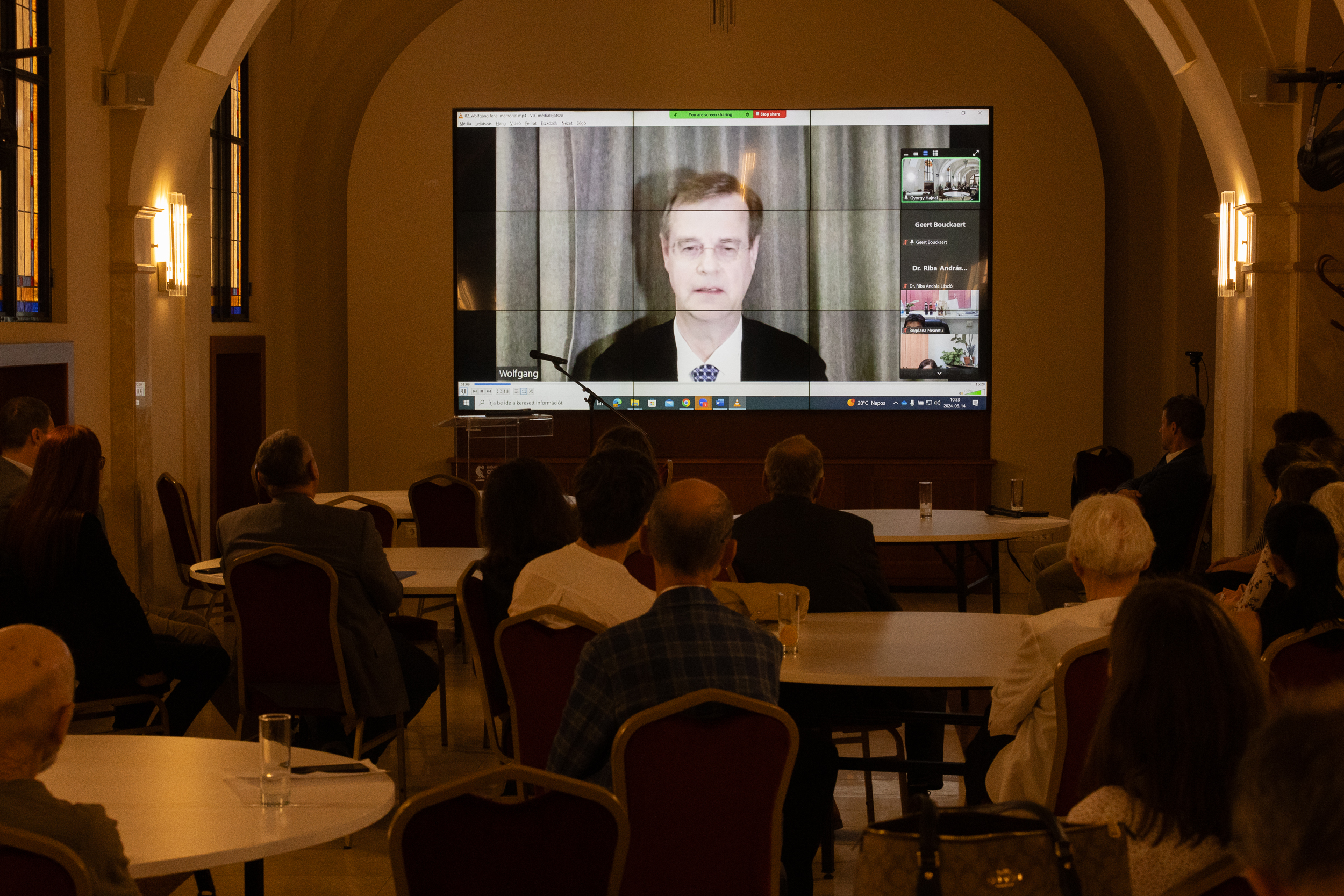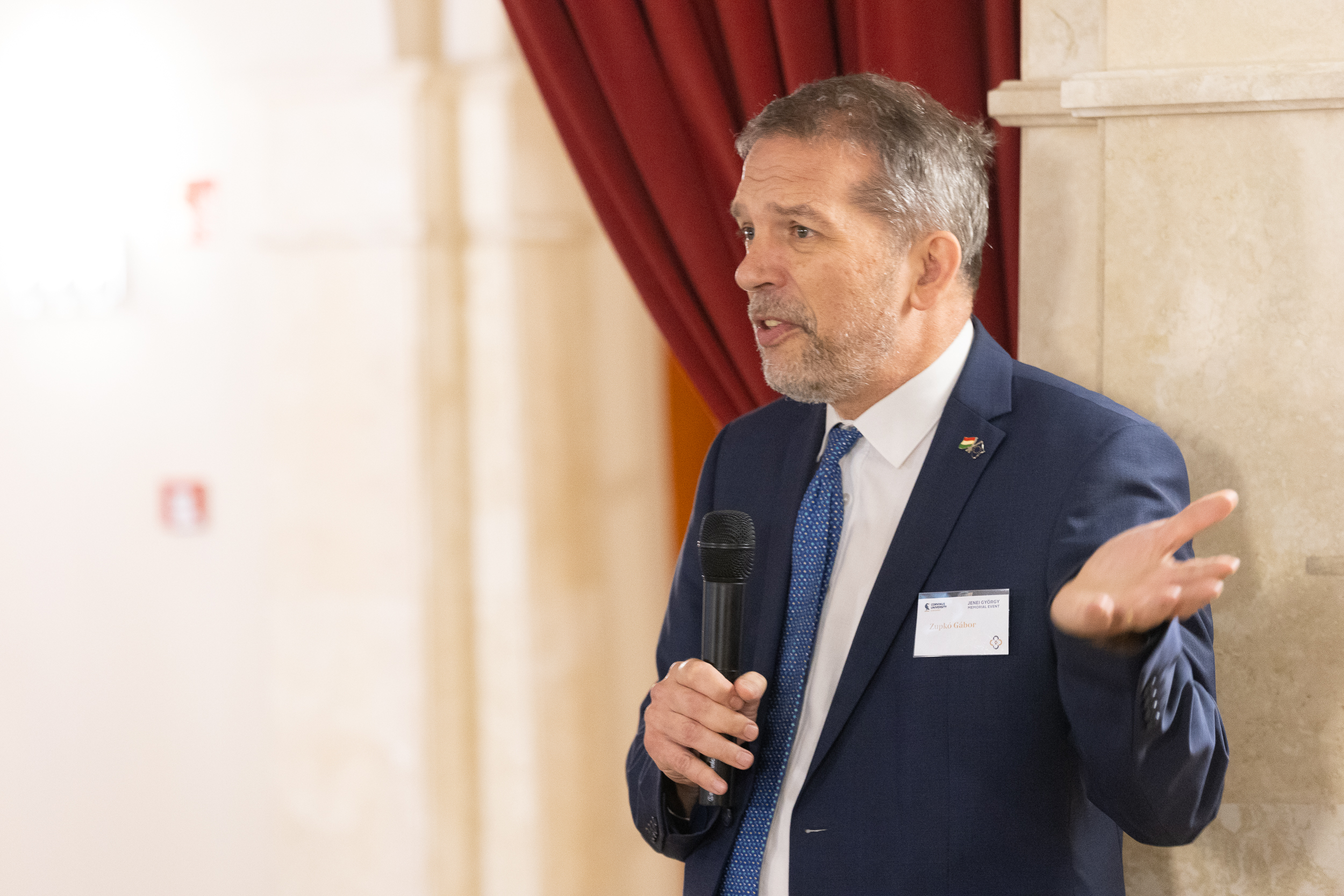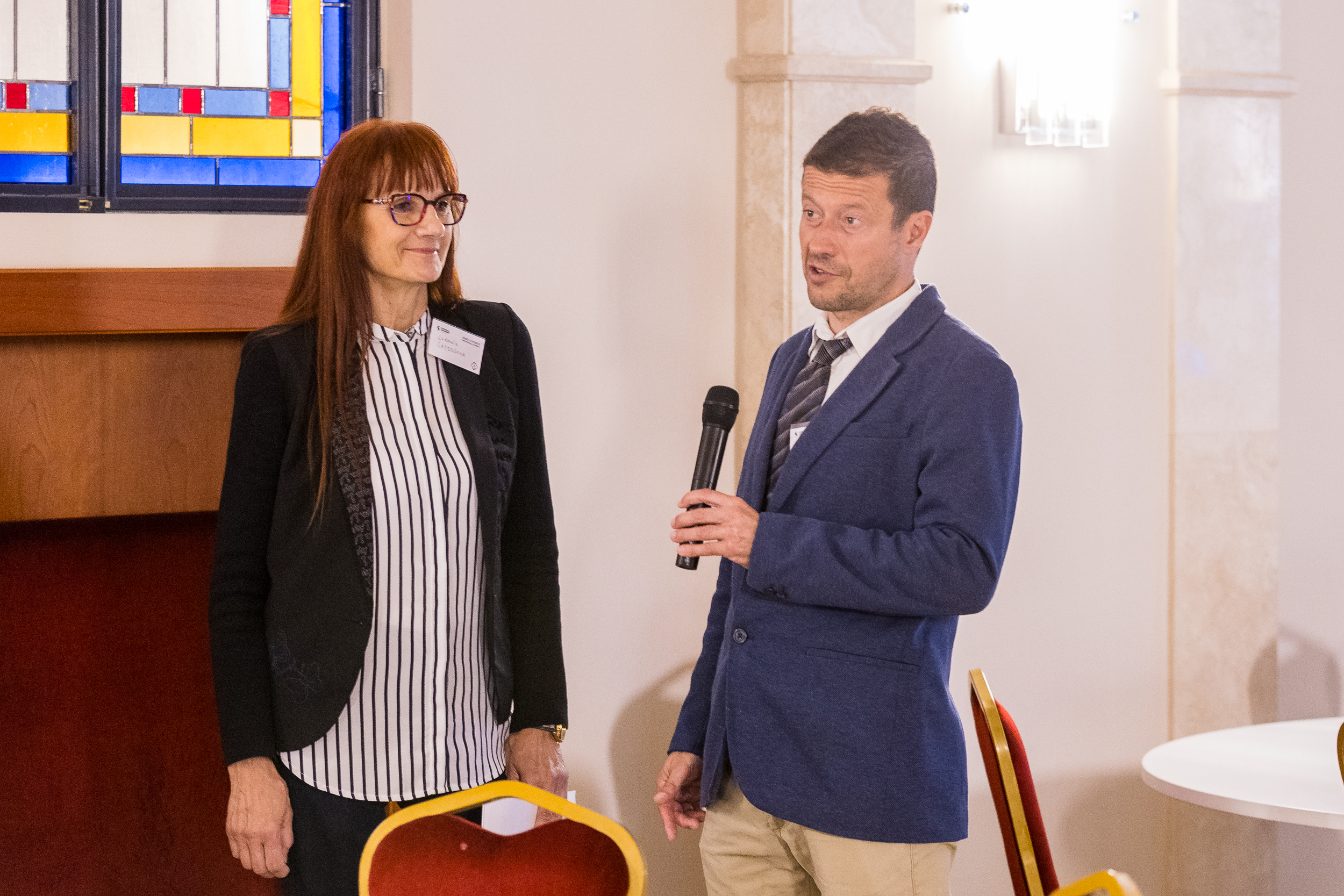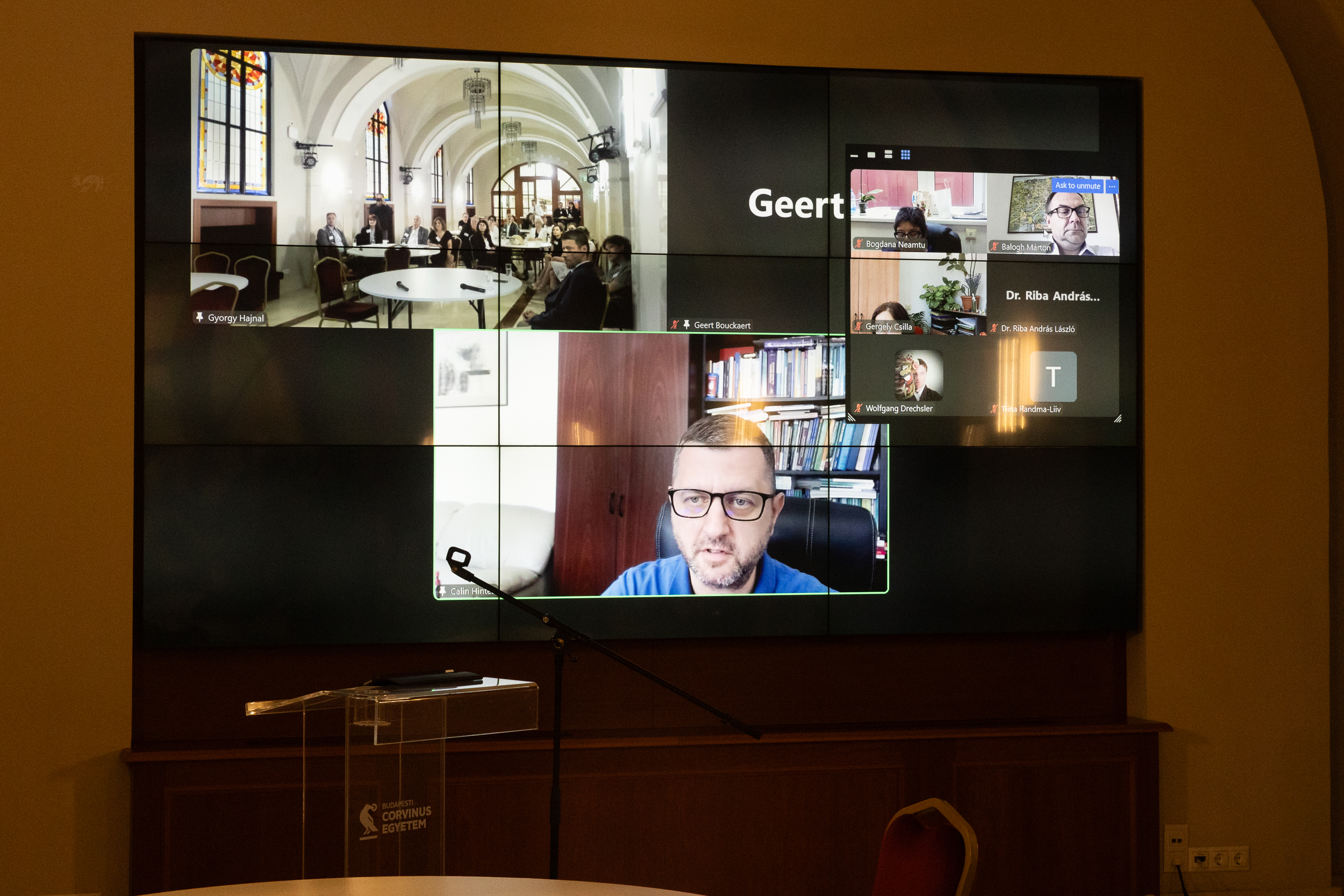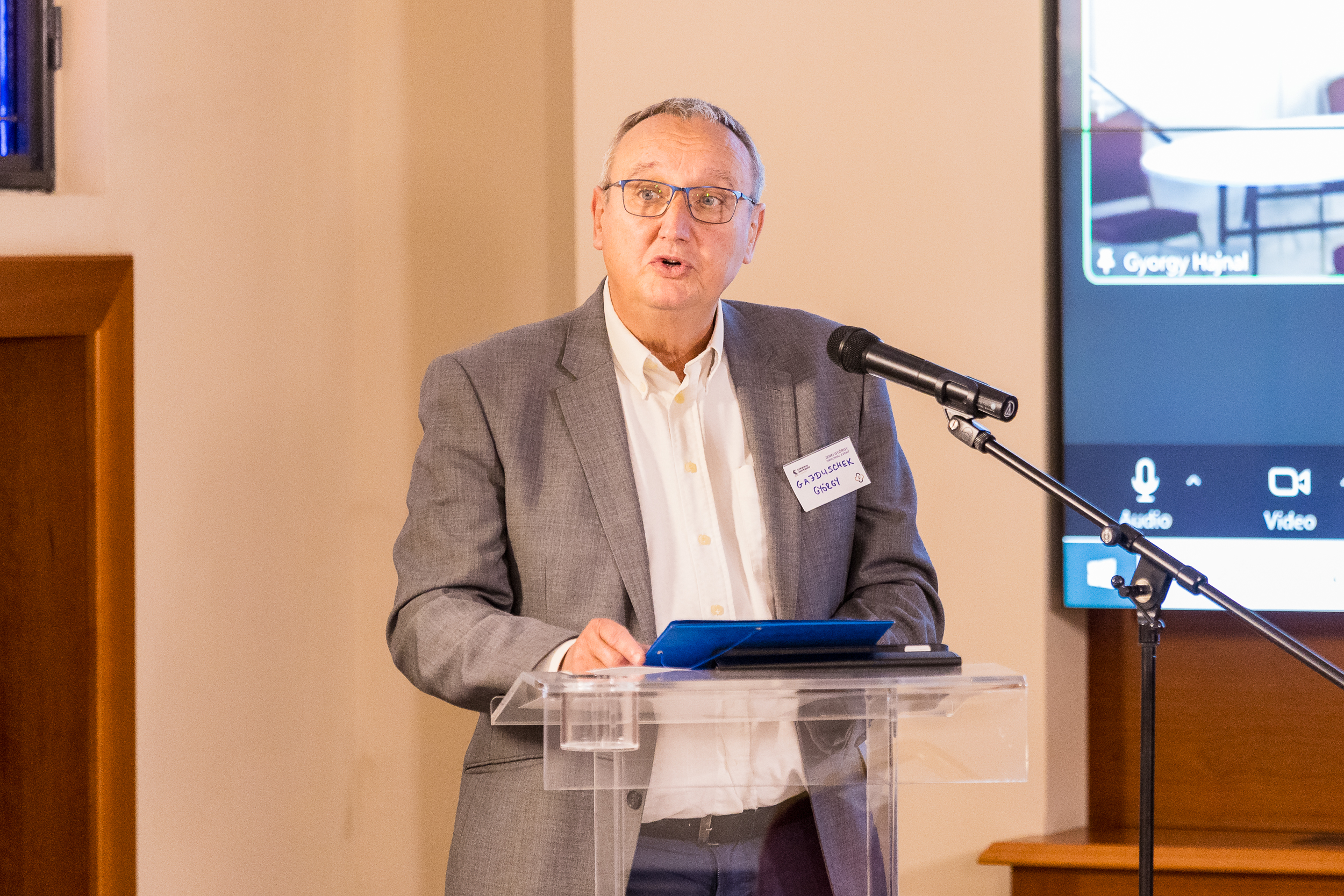György Jenei: a renaissance and pioneering scholar of public policy, with unparalleled helpfulness
_20240625025007.jpg)
Organised by Corvinus University’s Department of Public Policy on 14 June, participants at the event recalled the remarkable life and academic work of the distinguished scholar, who died in 2024, leaving a lasting mark on the study of public policy and public administration. In the introductory presentation of the conference, Professor György Hajnal, Head of the Department of Public Policy, said that the organizers – colleagues, students, friends and family members – were motivated by their own inner urge to organise a memorial conference. They set it as the aim of the event to recall Professor Jenei’s scientific achievements and personal stories associated with him through the memories of the participants.
Jenei Prize for international authors and students of Corvinus
Professor György Hajnal then spoke about the development of public policy research and education in Hungary and Central and Eastern Europe, a process of which György Jenei was a central figure – providing guidance to several generations of colleagues and students, including the speaker, with his acerbic and selfless wisdom. He highlighted: One of Professor Jenei ‘s greatest and most lasting achievements was that, going beyond the legal approach of the past, he recognized and created public policy and public management (PPM) as a discipline in Hungary, essentially from scratch. He played a key role in the teamwork that resulted in the establishment of a multidisciplinary institutional centre in the predecessor of Corvinus in 1991, now known as the Department of Public Policy, Professor Hajnal added. The establishment of the department was also an inspiration to others in the region, and for another decade and a half it was the only place in Hungary where PPM was taught and researched. Hajnal stressed that Professor Jenei was a key figure in many ways: a “great international diplomat of the branch of science, a leader of international professional institutions, a scientific author, a lecturer and a mentor”.
Professor Hajnal announced that Public Management Review, one of the renowned journals in the field, where the presenter published an obituary about him, will establish a prize to be awarded annually to the author of the best non-traditional article published in the journal. The professor also announced that the award for the best thesis at Corvinus University’s Master’s in Public Policy will now be called the György Jenei Prize.
György Jenei was a key figure in the entire European scientific community
Geert Bouckaert, Professor at the Catholic University of Leuven and a key expert in comparative public administration and performance management, who is also a regular guest lecturer at Corvinus, joined the event online. In his reminiscence with a personal tone, he spoke about the 30 years of cooperation between the two institutions in public policy research and education, and how he considered György Jenei not only a colleague, but also a friend and part of his family. He recalled that he met György Jenei for the first time when he visited Hungary for the first time in 1985 for an East-West seminar. A few years later, the Berlin Wall came down – related to that, Professor Bouckaert said that Jenei had once shared with him that he had never before in his life imagined that the Iron Curtain would ever be torn down. When it happened, Jenei rewarded himself by walking under the Brandenburg Gate several times to feel that Hungarians were part of Europe. Bouckaert added that he still gets emotional when he remembers this story.
Turning to the relationship between Leuven and Budapest, he highlighted three cycles: the periods of 1992-2004 and 2004-2012, and since 2012. Hugo van Hassel was a key player in making these contacts, and he made several trips to Eastern Europe, even sacrificing his holiday for that. When he met György Jenei, they got on well, they shared a common interest in political systems and a common view of history. It was thanks to the two of them that the EGPA conference on the topic of new trends in public administration and public law was held in Budapest in 1996. He added that after the event, they went to Transylvania, to Cluj-Napoca, and this showed the extent to which Budapest, the University of Economics, was at the forefront of cross-border thinking – and “György Jenei was one of the driving forces behind the launch of this trans-European dialogue”. He jokingly remarked that, along the dialogue, wine imports from Hungary to Belgium was also taking place. 2004 was an important year, by that time networks working on the subject were able to hold a meeting in Budapest thanks to György Jenei, and Hungary joined the EU together with its Eastern European peer countries in that year, and Hugo van Hassel, who died just two weeks after the accession, proposed a few days before his death that flowers should be sent to their friends in Central and Eastern Europe to mark their accession to the EU. Regarding 2009, he highlighted the publication of a volume on public administration reforms in Central and Eastern Europe, co-edited by György Hajnal (currently a professor at Corvinus University) and two other colleagues. This was the first outstanding achievement of the joint networking. Professor Bouckaert recalled that György Jenei also generously supported his appointment as honorary doctor at the Budapest University of Economics in 2010.
Professor Bouckaert considered 2012 as an important milestone because it was the year when the Master’s Degree of the University of Economics was accredited and the year when the meeting of the Trans-European Dialogue was organised, covering the topic of politics of agency governance, which would still be relevant today. He said that professional trips of many Hungarian colleagues to Belgium were greatly encouraged by György Jenei, who himself made numerous visits, always with a specific professional purpose. Bouckaert said: when Jenei was in Hungary, he was Hungarian, when he was in Belgium or Leuven, he became a citizen of Leuven. Professor Bouckaert considered that the importance of the cycle since 2012 lies in the fact that knowledge has been passed on to the next generation starting from that year – in this regard, he noted that György Jenei was extremely generous to young people, he helped them, including the current Head of Department, György Hajnal, whom he was mentoring. Thanks to György Jenei, Corvinus has become an active member of European research networks, and Professor Bouckaert also mentioned among György Jenei’s merits that he was bringing people together and he was a good organiser. Professor Bouckaert concluded by saying that for the sake of the future, academic autonomy must be defended through joint efforts and all must develop. He considered György Jenei to be an impressive personality who played a key role not only at the Budapest University of Economics but also in the entire European academic community and, of course, in Leuven, and who will never be forgotten.
György Jenei’s brave advice on opening borders
The conference continued with a pre-recorded online contribution by Wolfgang Dreschler, Professor at Taltech University in Estonia. In his speech, he said that he met Professor Jenei as a personal mentor and helper during some work carried out by a European consortium, in which Hungary and Estonia were the only members from Central and Eastern Europe. They later worked together in several international professional organisations. He particularly appreciated György Jenei’s brilliant leadership skills demonstrated during the 2008 financial crisis as president of NISPAcee, a network of universities having public policy courses in Central and Eastern Europe, while almost apologising for the fact that it was not him – Dreschler – who was the president of the organisation. They became more than colleagues, Dreschler said; they became friends, resonating intellectually through the figure of Max Weber, who embodies modern public policy responsibly and sensitively, more than anyone else. For him, György Jenei represented his father’s generation, with György Jenei living most of his life in the bygone socialism, and saving the Weberian legacy from the past to that era. This was the right thing to do, but it was a brave thing to do; to illustrate this, he explained that, according to many Eastern European researchers, Weber and Nietsche were the two thinkers who could not be studied in these countries because they were really afraid of them.
“György Jenei’s contribution to the way the state is managed in practice is world class, “ said Dreschler. He emphasized that the professor’s historical courage was also demonstrated by the fact that, in 1989, as an advisor to Prime Minister Miklós Németh, as a member of a six-member panel, he advocated the need to open the borders to East German refugees – a heroic decision, for which, incidentally, he took care to pack his own suitcase as well, the Estonian scholar added. Dreschler viewed Jenei as a true, responsible and honest Central European gentleman, who had respectfully assumed the local heritage and lifestyle. In his closing remarks, he said that there is a danger that we will no longer see personalities like György Jenei, and this is why his legacy should be particularly valued. He said it was an honour to know him and be his friend.
Thanks to Jenei, the University of Economics was enriched by a pioneering approach
György Gajduschek, Professor at Corvinus University, spoke about György Jenei’s scientific contributions to Max Weber’s achievements and how they can be applied to the problems of public policy and management today. In his introduction, he emphasized that Professor Jenei played a key role in integrating the Western, descriptive approach to public administration – an approach from social sciences, organizational studies and political science – in Hungary, where traditionally the legal approach had dominated the field. Jenei introduced public policy and public management approaches to the field of study, whereby the programme of the University of Economics of Budapest was an island among other public administration courses in Hungary for a long time.
Reflecting on György Jenei’s work on Max Weber is a formidable task, as “in the past three decades he has written more than twenty major publications on the subject in Hungarian and English, often in collaboration with Hungarian or international colleagues”, he said. György Jenei’s philosophical background enabled him to reconstruct the theoretical foundations of Weber’s work, the presenter stressed. He noted that translating concepts from one theoretical universe to another is incredibly difficult, and Jenei often mentioned, for example, that Weber’s concept of rationality is mistranslated as efficiency, just as the iron cage of bureaucracy is a mistranslation. While bureaucracy is typically viewed as a structural organisational aspect of public administration, Jenei convincingly related this static approach to the dynamics of government, namely public policy and public management. In this respect, his work is quite exceptional in this field, Gajduschek underlined. Professor Jenei was one of the first scholars to introduce the approach in Hungary that the link between bureaucratic theory and the challenges posed by the new public management is to be widely debated. He was also an early proponent of the NeoWeberian concept of government – they examined the unique challenges presented when that concept was adopted or misapplied to the Hungarian public administration sytem or post-communist ones in general. Professor Jenei’s work on bureaucracy is also noteworthy because he read and interpreted German studies in English and then applied the theoretical framework and insights to practical public administration and administrative reform; in essence, he used Western approaches to address Eastern problems. This is a testimony to his remarkable intellectual versatility – György Gajduschek pointed out in his presentation.
He was one of the nicest people I have ever met in my entire career
The conference continued with contributions from the audience. Calin Hintea, Dean of the Faculty of Political Science, Public Administration and Communication at Babes-Bolyai University in Cluj-Napoca, stressed in an online contribution that he and his colleagues consider György Jenei as one of the founders of their school, of whom they are very proud, and who selflessly, kindly and generously helped them, the inexperienced young people, to build up their study programme. Hintea pointed out that György Jenei was the nicest person he had ever met in his whole career, who really tried to help everyone. And, Hintea added, it was very easy to establish a personal relationship with him: “as a renowned international professor, he did not care that Hintea’s position at the time was only assistant professor and Hintea asked for his support as such”. Hintea announced that the Babes-Bolyai University would award Professor Jenei with a posthumous Excellence Award.
Ludmila Gajdosova, Managing Director of NISPAcee, said in an in-person contribution that György Jenei’s death was a great loss for her: his friendly and supportive personality had been part of NISPAcee’s life since the 1990s. Gajdosova said that the first textbook on public policy in Central and Eastern Europe was published by them in 2003, with the help of György Jenei and others. The professor also received an award from the organisation in 2005 for his teaching work, which he was very happy about, and it was a sign of his openness that he even danced at the evening’s gathering, showing how important this community and these personal connections were for him, the contributor recalled, adding that it was the first really big party in the organisation, a party that nobody wanted to finish. György Jenei was later persuaded to take up a position in NISPAcee, which helped them greatly in building close links with other professional organisations and in increasing their recognition and impact, and he developed their strategy in 2008, and authored the expansion of their mission statement, which is still valid today.
Gabriella Ilonszky, Professor Emerita of Corvinus, recalled that Professor Jenei was an outstanding academic. The institutionalisation of public administration was a borderline field of study that they both researched, as a kind of competitor to each other, and she has been asked about him at political science conferences ever since, a sign of great impact Jenei has had.
Gábor Zupkó, Head of Representation of the European Commission in Hungary, said that he had been working in the public sector since 1990 and approached Professor Jenei because he wanted study public administration from a perspective beyond the legal approach, and soon after he became a PhD student of the professor, who encouraged him to go to Leuven to do research and stressed the importance of international networking. Gábor Zupkó said he missed Professor Jenei very much and was honoured that Jenei called him his friend.
He was a Renaissance type of man and a loving person
Attila Bartha, Associate Professor at Corvinus, recalled that between 2017 and 2020, at the invitation of György Jenei, they worked in a shared office, where, in a fantastic atmosphere, he learned a lot from György Jenei, and not only from a scientific point of view, and he was grateful to György Jenei for that. He viewed Jenei as a renaissance-type, passionate, entertaining and hard-working man who formed opinions on everything from music to sports, loved to argue and also enjoyed other aspects of life.
Attila Petheő, Head of the Department of Business Development and Management, recalled that, although they did not work on a common topic, they once travelled together to a conference in Târgu Mures, and afterwards, whenever they met in the corridors of the University, they stopped and started talking, and he felt that this was a friendship without boundaries, he called him Uncle Gyuri. Jenei was a happy and funny man, who “welcomed colleagues with the warmest heart and love, and this was a unique attitude at the University, we need more people like him”, he added.
On behalf of the family, Zsolt Jenei thanked the organisers, György Hajnal and Edit Waffenschmidt. He recalled that György Jenei’s career started in 1965 at the University of Economics, and even after retirement, at the age of 80, he was still working, the University was his second home, and Zsolt Jenei also referred to György Jenei’s role as a grandfather. He said that György Jenei’s memorial service was held on 1 March 2024 at a private family gathering, and expressed his gratitude to all those who were attending the present memorial event, where 13 members of the family were in attendance.
Born in 1942, Professor emeritus György Jenei, who passed away this year, was a Doctor of the Hungarian Academy of Sciences, a former Head of the Department of Public Policy (earlier: Department of Public Service, then Department of Public Policy and Management) of Corvinus University of Budapest, was a widely loved and respected scholar of public administration, both in Hungary and internationally, and an outstanding personality establishing a new school of thought; he was not only a distinguished scholar, but also a highly esteemed mentor and friend of many, who until recently had been actively involved in the life and events of Corvinus. Professor Jenei’s work is not just theoretical: His insight into the historical context of Hungary in Europe and his nuanced political vision, full of hopes and occasional disappointments, had a significant impact on the worldview of his students and colleagues.
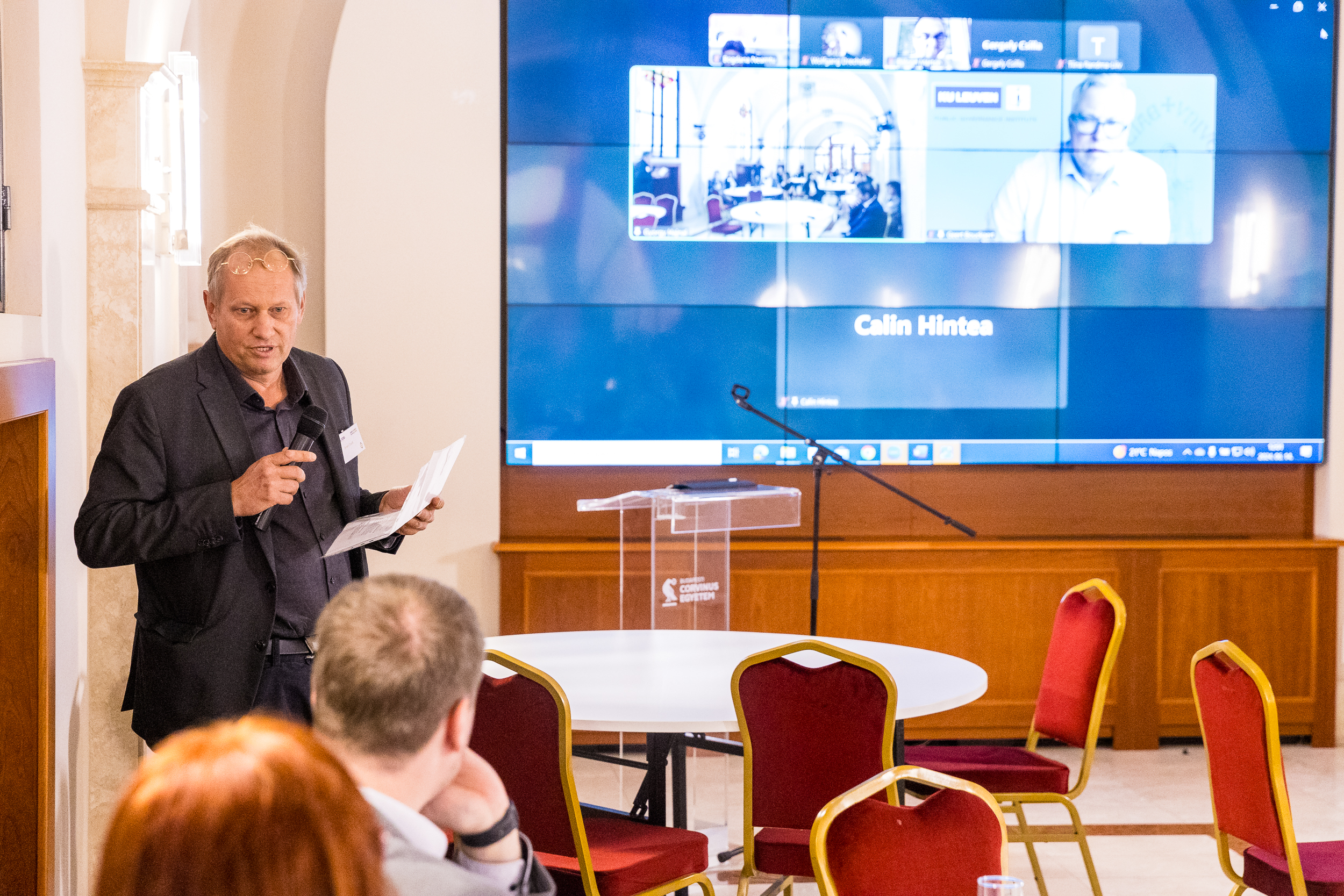
.jpg)
